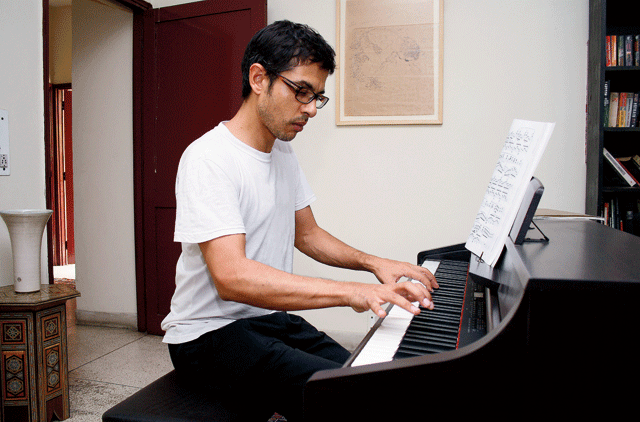
He looks much younger than his 39 years and has an accent that is not wholly British - something that is a trifle surprising given that he was born in Canterbury, England, to mother Barbara and father Ashish Dasgupta, and spent most of his childhood in Cambridge with his parents and younger sister, Mitali. The accent could have something to do with the fact that he has also spent a lot of time in France, the US and Malaysia. He is currently based in New Delhi, India.
It's a pleasure interviewing Dasgupta. He speaks clearly as he reveals his passion for history and literature. His writing incorporates political, philosophical and historical preoccupations deftly narrated through fluid prose that is rich in imagery and poignant moments. All in all, brave, splendid writing.
How strange then that Dasgupta describes his transition into literature as one of the greatest challenges he has faced. He worked in marketing for several years before taking up the pen. It took him four years to write the highly acclaimed Solo, which won the Commonwealth Writers' Prize, considered one of the world's most prestigious literary awards. The achievement is especially extraordinary when you learn that this is only his second work, succeeding his impressive debut novel Tokyo Cancelled.
Solo encompasses a century of communist and post-communist regimes in Bulgaria as narrated by a visually challenged Bulgarian.
The award is presented annually for the best works of English fiction produced by writers from the Commonwealth.
He says he has been greatly influenced by much of medieval literature and recalls his fascination with history while growing up. "Chaucer's Canterbury Tales,'' he says when I ask him to list a book that has influenced his writing. "Some of my earliest memories are of childhood visits to the Canterbury Cathedral. I remember how impressive the vast, dim interior seemed. I was absolutely enthralled when I saw the exact place where Thomas Becket was martyred."
After attending a boy's school in Cambridge, he went on to graduate in French Literature from Balliol College, Oxford in 1994. He then did his postgraduate studies in Communication Arts at the University of Wisconsin.
A lover of the classics, he fondly remembers poring over James Joyce's Ulysses during the 15-minute breaks he was allowed to take while on summer jobs. When he's not writing, Dasgupta indulges in music and enjoys playing the piano. "When I look back at myself growing up, the image I see is of me playing the piano. It's still one of my purest loves."
Despite his literary success, Dasgupta remains humble and confesses that he has been amazed by the critical acclaim his novel Solo has received. Having already conceptualised the idea for his third novel, Dasgupta is most certainly an author to keep a close eye on.
I, ME, MYSELF
I am often tempted by opportunities to speak to strangers. I'm intrigued by other people's lives and I like hearing their stories. Not all strangers are interesting, of course, but sometimes you meet someone you don't know and you [enter] another world. If that person is very sensitive to his world - and very articulate about it - one can learn a lot.
I am proud to say that my three-year-old daughter Amália likes to spend time in her mother Monica's art studio. It feels good to see a little girl growing up seeing her mother led by her own creative passion.
I am very particular about the way the kitchen is laid out. It's important to have a functional kitchen where I can cook easily.
I cannot say that I have never gone wrong because I always go wrong! There's nothing that I do that I don't make mistakes in. I don't think succeeding is about not failing, because in the end you learn because of failures. Every major enterprise will go wrong somewhere: the secret is to know where it went wrong, and finding out how you can correct it.
I have a weakness for kilims and Persian rugs. All my usual financial caution leaves me when I see a beautiful carpet.
When I'm in a city, I love to walk around. Delhi is not pedestrian-friendly. But when I go to cities like Sofia, Tokyo, New York and Paris, which are designed for walking. I can walk the whole day.
I feel protective towards eccentric people. Society often closes ranks against eccentricity. There's so little eccentricity left, I feel new hope each time I find it.
I am still ignorant about everything. I have a few techniques for finding things out, but I don't actually know anything. I wish I did.
I have overcome my fear of speaking in public. I was always terrified of speaking in front of people but not anymore.
I read much less than I should. I have planned my next book, which is a portrait of Delhi in the 21st century.
I am often asked who I write for. I would say that I write to communicate things but I don't know who I am addressing. It's like throwing things out into a void...
I, ME, MYSELF
Me and my career choices
I am happy writing books now, having done other jobs earlier. From 1994 to 1995, I worked for a management consultancy firm and from 1997 to 2000, I was with a British marketing firm. Initially, I worked for the company in London and was later asked to set up the office in San Francisco, US.
Me and my goals in life
I don't have any ‘goals'. I don't like sporting metaphors for life. I just want to carry on creating things that express what I think and feel - books for now, but that could change. Maybe when I'm older I'll become less wordy and I'll make tables instead of books. I would really like to make a film at some point in my life.
Me and my photography
Photography has always been a kind of preparation for my writing. If I would like to write about a place that I don't know much about, I spend a lot of time taking photographs. This helps me establish a relationship with the place. It helps me to look at it deeply.
Me and my struggles
I find writing a book to be one of the most difficult challenges. I have done corporate jobs before, which were much easier. Writing books is tough; I make many mistakes and have to keep throwing much of my work away. There are probably writers who can write easily. They start a book, reach the end and hand over the manuscript to the publisher. But it doesn't come so easily to me.
This could be because I choose to write about questions that I don't know the answers to. I start off not knowing the slightest thing about what I'm doing and over the course of two or three years, I teach myself how to do it. That's the whole point for me - I write in order to learn.
Me and the Commonwealth Writers' Prize
This is the first prize I have received for my writing. It came as a very pleasant surprise. It's a kind of validation - it means I'm not terrible at what I do.
If you work in a company, you know how you're doing because you get promoted and are often told that you're doing a good job. But writers carry their work in their heads and for years they have no idea how good it is. A prize can help calm your doubts.
Me and the person behind my success
A book only has one name on the cover but there are always many people involved. Most important of all is my wife, Monica. She's an amazing reader and critic, and she also knows how to deal with the highly insane person I become when I'm writing a book.
Me and the people I admire
I admire people who have gone into any field in great depth. I love watching tennis, for instance, which is a sport that demands great depth from anyone who wishes to excel at it. But tennis is a very obvious field, and I think the people I admire most are the ones who have become geniuses in a field that is completely obscure - a field that didn't exist until they created it.
Consider the writer WG Sebald. He's ventured deeper into aspects of human life than anyone before him - no one even thought of writing about the things he addressed before he put pen to paper.
Me and my principles
My principles are completely contradictory. On the one hand, I'm a radical democrat and on the other, a total snob - and I hold both these positions very passionately.
I do believe in the fundamental potential and wisdom of all people. I believe in the multitude, and I mistrust all the ideologies we use to reduce its variety and power.
At the same time, I think I'm a total elitist. I'm absolutely dismissive of everything that is done in a mediocre way.
I, ME, MYSELF
On winning the Commonwealth Writers' Prize you said, ‘I'm a writer who writes more for myself, as it's an intensely personal thing. To see that striking a chord is not something I had counted on.' Comment.
The writer is always concerned with questions that preoccupy him or her. And the extent to which the book actually affects other people is unknown until it gets published. Writing for me is an inner journey.
Do you form a bond with the characters you write about? Are they inspired by real life people?
My characters are not based on anyone I know. But I might have seen someone doing something that I think is interesting and I replicate that action through a character's. My characters are independent in their own right. However, during the course of writing they become real to me.
Do you conduct a lot of research before starting a new book?
My fiction is usually about places that I haven't lived in and don't know about, so yes, I have to do a lot of research beforehand. And the research includes absolutely everything - history, sociology, characterisations... everything from their homes, where they come from and the way they dress. I travel around interviewing people, visiting homes, restaurants and factories. It took four years of research to complete Solo.
Do you take a break between finishing a book and starting a new one?
I am writing a book at the moment but I already know what the next book will be about and am simultaneously gathering material for it. But I do think that you reach a state of near madness writing a book and need some time afterwards to come out of it - at least I have to do so.
I know many writers who can finish a book and start writing the next one the following day. But I can't. With Solo, I came out of a four year obsession and needed several months to calm down and get ready for the new project.











